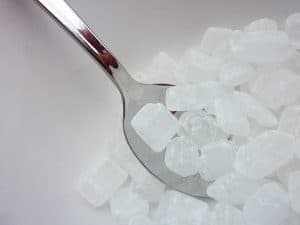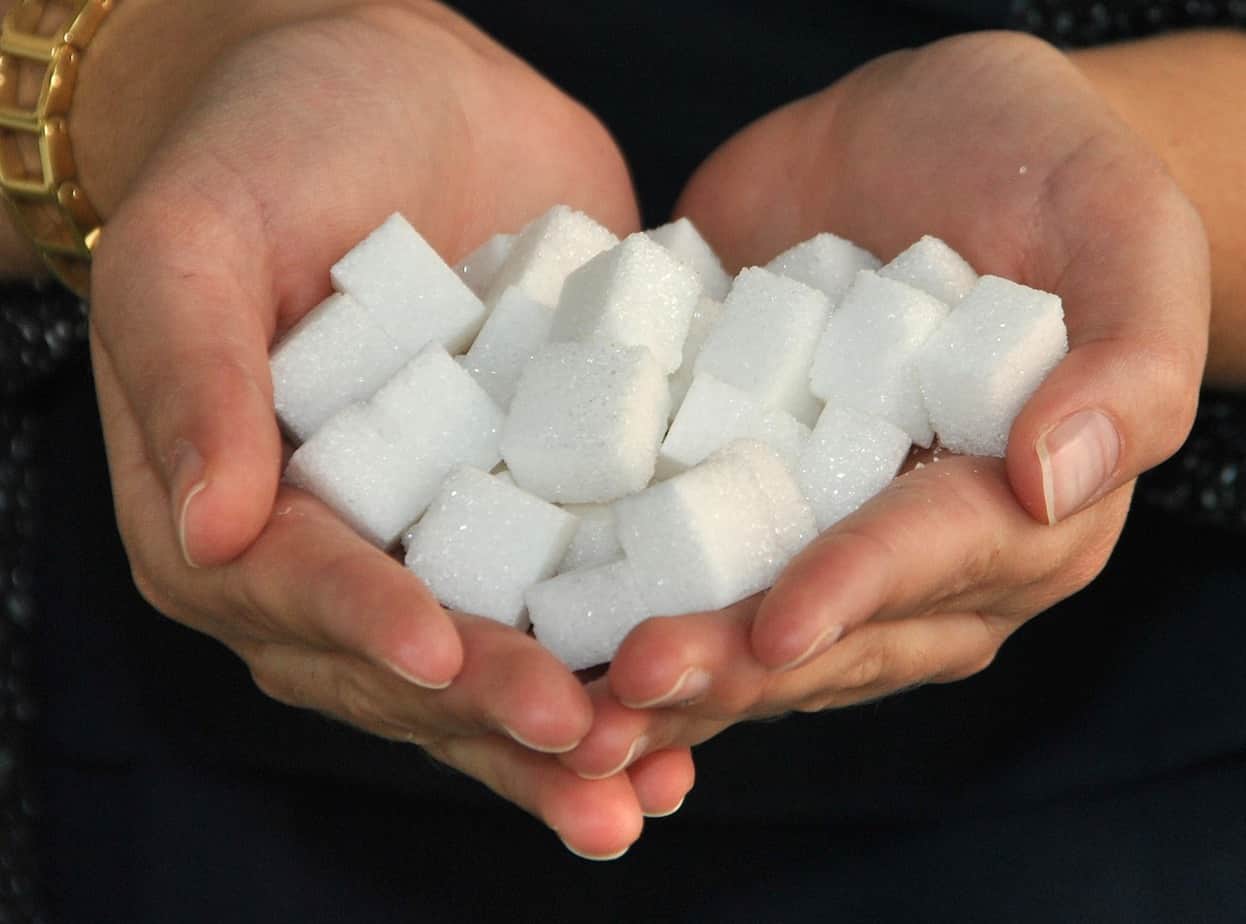Most people have a sweet tooth to some extent. This insatiable drive to gorge on saccharin treats is not a new phenomenon.
In fact, our love of sweet foods is hardwired into our evolutionary DNA. As nature would have it, sugar is the quickest way to sure up our glycogen stores, our natural go-to energy bank.
This is essential for survival. The plant world has also taken advantage of this. That is why the angiosperms (flowering plants) produce fruit.
This helps them spread their seeds around since animals desire the sugary flesh so much.
So it’s all well and good right? Having a sweet tooth and consuming sweet things all work good according to nature, correct?
Naturally yes, but unfortunately, our extraction and consumption of sugars today is anything but natural. We now live in a society where dietary sugar intake is in extreme excess.
Excess sugar can disrupt your insulin sugar management system and cause a rapid accumulation of body fat. This has led to the uncanny prevalence of lifestyle=related diseases such as obesity and diabetes.
Having diabetes requires strict management of your health and lifestyle, especially when it comes to dietary sugar intake. After all, sugar is a major proponent behind the diabetic dilemma.
By managing your sugar intake, you are essentially eliminating a majority of the risk posed by the condition, giving you a new lease on life.
So how do you effectively decrease sugar intake? It’s easier said than done. That’s because most of the food you will come across on a day to day basis contain sugar in some form or measure.
It is estimated that over 70% of commercially available food contains added sugar. That’s not counting all the refined carbohydrates like white bread and pasta that essentially pose the same threat as pure sugar.
The best workaround is first to get smart with your food. Know your nutritional values, and hunt down some worthy natural sugar substitutes.
5 Natural Sugar Substitutes for Diabetics
1. Xylitol
Xylitol is gaining popularity as an alternative sweetener in today’s health and wellness space.
It’s probably the most widely available sugar substitute since it not only mimics the taste but also the look of real sugar.
Xylitol is, in fact, an alcohol sugar. It is commonly used in medication and orally administered treatments like toothpaste and mouthwash.
Today it’s now popular as a substitute for regular sucrose in cooking and on the table. The only difference is that it does not melt and caramelize like regular sugar. Always check your recipe.
Although xylitol may have a lower caloric value than normal sugar, it can still have an effect on blood sugar levels. Moderation and mindfulness are still essential.
One important note, especially for pet owners, do not feed xylitol to dogs! It is extremely toxic and almost always fatal even in moderate doses!
- Pure Xylitol
- No Other Added Ingredients
- 1/3 Fewer Calories Than Sugar
- Keto Diet Friendly
Last update on 2025-04-26 / Affiliate links / Images from Amazon Product Advertising API
2. Coconut Sugar
Coconut sugar has gained popularity as a natural sweetener in recent years, especially among individuals looking for healthier alternatives to traditional sugar.
Derived from the sap of coconut palm trees, coconut sugar offers a unique combination of sweetness and nutritional benefits, making it a suitable option for those with diabetes.
One of the key advantages of coconut sugar is its relatively low glycemic index (GI) compared to regular sugar. The glycemic index measures how quickly a carbohydrate-containing food raises blood sugar levels.
Coconut sugar has a GI of around 35, whereas table sugar has a GI of 60-65. This lower GI means that coconut sugar causes a slower and more gradual rise in blood glucose levels, making it a favorable choice for individuals managing their blood sugar.
Additionally, coconut sugar contains trace amounts of nutrients that can provide some health benefits. It naturally contains small amounts of minerals such as potassium, magnesium, zinc, and iron, along with antioxidants.
While the quantities of these nutrients in coconut sugar are not significant enough to rely on as a primary source, they can still contribute to overall nutrient intake when used as a substitute for regular sugar.
Coconut sugar is also known for its distinctive taste. It offers a pleasant caramel-like flavor that can enhance the taste of various dishes and baked goods.
It can be used as a one-to-one replacement for regular sugar in most recipes, making it easy to incorporate into your favorite meals and desserts.
As with any sweetener, moderation is key. While coconut sugar is considered a healthier alternative, it still contains calories and carbohydrates.
Therefore, it is essential to monitor portion sizes and incorporate it as part of a balanced diet.
It’s always advisable to consult with a healthcare professional or a registered dietitian to determine the appropriate use and portion control based on individual dietary needs and diabetes management goals.
Coconut sugar provides a natural, lower glycemic index alternative to traditional sugar.
With its unique taste and trace amounts of beneficial nutrients, it can be a suitable option for individuals with diabetes looking to manage their blood sugar levels while still enjoying a touch of sweetness in their
- DELICIOUSLY SWEET INGREDIENTS: Our Organic Coconut Sugar is made from one pure and simple ingredient - organic coconut palm sugar.
- USAGE: Our organic coconut sugar can be used as a one-for-one replacement for refined white sugar or brown sugar in sauces, beverages or in baking.
- SOURCING: Our Organic Coconut Sugar is sustainably grown in Indonesia and harvested by tapping the sweet nectar from the tropical coconut palm tree flower.
- CERTIFIABLE QUALITY: USDA Organic, Non-GMO Project Verified, Kosher Certified, Gluten Free, and Vegan
Last update on 2025-04-26 / Affiliate links / Images from Amazon Product Advertising API
3. Raw Honey
Honey is one of the most coveted natural sweeteners out there. It has been a luxury commodity from the dawn of civilization due to its natural scarcity.
It also boasts a plethora of other health benefits such as anti-inflammatory, antioxidant and antimicrobial.
Honey is, however, a bit of a catch 22, while it bears some awesome health properties, it’s also a high GI sugar compound.
It contains both glucose and fructose which have a significant impact on blood sugar levels and liver health.
Moderate use of honey can still help you achieve a net positive effect on your health as a diabetic, especially if you factor in the heart health benefits it comes with as well.
4. Stevia
Another big hit in the health and wellness community is stevia. It’s a natural plant extract which is many times sweeter than regular sugar, but also with a negligible caloric value.
This makes it perfect not just for diabetes management, but also for weight watching.
Because it’s so much sweeter than sugar, you’ll need so much less in order to achieve the desired taste. It has been known to leave a lingering aftertaste that some people find unwelcome. But blended with the right recipe, you won’t notice a thing.
Stevia is available in liquid form and some brands even offer it pre-flavored, which is great for cooking, baking or flavoring desserts.
It has also been approved in the US by the FDA after the manufacturers of Truvia and PureVia presented evidence and research to support its safety.
- One 9.7 oz package of Happy Belly Granulated Zero Calorie Stevia Sweetener
- Stevia with maltodextrin
- Zero calories
- An Amazon brand
Last update on 2025-04-26 / Affiliate links / Images from Amazon Product Advertising API
5. Monk Fruit
Monk fruit extract, also known as Luo Han Guo, has gained recognition as a natural sugar substitute with several health benefits, particularly for individuals managing diabetes.
Derived from the monk fruit, a small green gourd native to Southeast Asia, this sweetener offers a unique combination of intense sweetness without impacting blood sugar levels.
One of the primary advantages of monk fruit extract is its ability to provide sweetness without the use of calories or carbohydrates.
This makes it an excellent option for individuals with diabetes who need to regulate their blood sugar levels. Monk fruit extract contains natural compounds called mogrosides, which are responsible for its intense sweetness.
These mogrosides do not raise blood glucose levels and are considered non-nutritive sweeteners. Another significant advantage of monk fruit extract is its lack of an aftertaste often associated with other sugar substitutes.
Many people find the taste of monk fruit extract to be more appealing compared to other artificial sweeteners, making it a popular choice for individuals seeking a natural alternative to sugar.
In addition to its sweetening properties, monk fruit extract offers potential health benefits. It is known for its antioxidant properties, which can help protect against oxidative stress and inflammation.
When using monk fruit extract as a sugar substitute, it is important to choose a reputable brand that offers pure monk fruit extract without any added fillers or artificial ingredients.
It is also advisable to start with small amounts and gradually increase as needed, as monk fruit extract is significantly sweeter than sugar.
Monk fruit extract provides a natural and calorie-free sweetening option for individuals with diabetes.
With its intense sweetness, lack of impact on blood sugar levels, and potential health benefits, monk fruit extract offers a promising alternative to traditional sugar and artificial sweeteners.
As always, it is recommended to consult with a healthcare professional or registered dietitian for personalized advice on incorporating monk fruit extract into a diabetes management plan.
- No Artificial Sweeteners
- Gluten Free
- Kosher
- Plant-Based
Last update on 2025-04-26 / Affiliate links / Images from Amazon Product Advertising API
Different Types of Sugar Alternatives
It is important to remember that when it comes to sugar substitutes, there are two basic categories.
The artificial sweeteners and the alternative sweeteners:
1. Artificial Sweeteners
Artificial sweeteners are synthetically produced sugar substitutes designed to mimic the taste with little or no caloric value.
That’s why they are often referred to as non-nutritive sweeteners. Examples include aspartame, known by the trade name NutraSweet and sucralose.
These tend to be thousands of times sweeter than regular sugar with little to no caloric value.

They are popular in commercial food products especially in the diet versions of soft drinks and confectionery.
Artificial sweeteners are commonly associated with several health risks including cancer, but research on this is still inconclusive and so far they are mostly considered safe.
2. Alternative Sweeteners
Alternative sweeteners, on the other hand, are naturally occurring chemical compounds with a similar sweetness profile to sugar.
They tend to have a caloric value although typically not as high as sugar itself. They may even be chemically similar in structure or origin to certain sugars.

Alternative sweeteners also include actual sugars compounded with other nutrients that give them a naturally low GI value as well as other health benefits.
We believe nature is best, so although many artificial sweeteners may be a good way to curb your sugar cravings, the 5 best sugar alternatives are the best way to lower your sugar intake.








